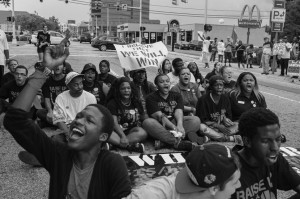Monica Dore, News Editor
For nearly three years, the Service Employees International Union has been organizing events to push for an increased minimum wage among other benefits, and in the last week the organization has been in the headlines for their actions in over one hundred cities.
Almost 500 arrests have been made since last Thursday, when thousands of fast food workers dropped their aprons and took to the streets. Protesters rallied for a $15 an hour minimum wage for fast food and retail workers, as well as the right to form or join a union without retaliation. Their actions have been applauded by President Obama, who shouted out to a Milwaukee crowd that “America deserves a raise.” Obama also encouraged the use of unions in his speech, claiming that, “the only thing more powerful than an idea whose time has come is when millions of people are organizing around an idea whose time has come.”
In 150 cities across the nation, fast food employees have walked out of their jobs and forced the restaurant that they work for to close for the remainder of the day. The protests have so far been non-violent, but according to MSNBC Reporter Ned Resnikoff, police officers carried batons to the latest protests anyway. Employees engaged in civil disobedience at the protests, doing things like sitting in the middle of roads to keep traffic from moving and participating in sit-ins at fast food chains. Civil disobedience is always non-violent, but it is still unlawful. Days before the protests began the SEIU announced that they were prepared for arrests, and workers were quoted saying that they are more afraid of living in continued poverty than they are of being arrested. In many cities, so many protesters were arrested that police used zip ties because there were not enough handcuffs available.

With the current federal minimum wage at $7.25, full time fast food workers make only $15,080 a year, a salary that many say is only fair to those who are young, single and living in rural areas. However, most fast food and retail workers are the sole providers of their households and must pay for daycare so their kids are not left alone when they go to work. This cost alone takes between $300 to $900 out of each month’s income leaving, at most, $960 to pay for rent, food, gas and utilities. Advocates for the Fight for 15 campaign feel that this is not enough to live on, and that it is impossible to rise out of poverty on such a wage.
On the other side of the argument are people who believe that fast food workers are earning a fair pay for the work they do. The general feeling is that unskilled laborers should not be making as much as someone who invested time and money at college. In addition, economists argue that more than doubling the minimum wage would have unseen consequences that leaders of the Fight for 15 campaign have not considered. Even a hike to $10.10 an hour has the possibility of putting 500,000 jobs at risk. Another problem economists point out is that the doubled minimum wage would crush small businesses that cannot afford to pay for a higher wage and job benefits.
When asked his opinion on the possibility of a $15 an hour minimum wage, one Business Economics major said, “Raising the minimum wage would make it much harder to get an entry-level job, ultimately affecting the youth of America who are trying to get their first job.” Other students agreed and expressed concern about the unpredictable consequences, such as unemployment, that would result from more than doubling the minimum wage.
Within the last year, we have seen an increase in the minimum wage of several states, including New York. San Francisco currently has the highest minimum wage at $10.74 an hour, but Washington State recently approved plans to raise the minimum wage to $15 over the course of the next seven years. The SEIU hopes to see these changes implemented sooner than 2021, but they are aware of the long fight that they face. For protesters, working hard and still not having enough money for food on the table is motivation enough to keep up the fight. In a discussion with NBC News, Latoya Cadwell, a Wendy’s employee and 31-year-old mother of four who lived in a homeless shelter until recently represented the resilience of the campaign when she said, “We know this is going to be a long fight, but we’re going to fight it till we win.”
Leave a Reply